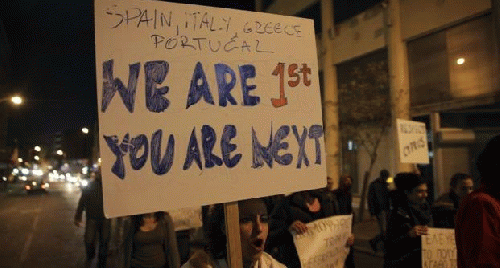(Article changed on March 29, 2013 at 16:26)
Source: Web of Debt
Confiscating the customer deposits in Cyprus banks, it seems, was not a one-off, desperate idea of a few Eurozone "troika" officials scrambling to salvage their balance sheets. A joint paper by the US Federal Deposit Insurance Corporation and the Bank of England dated December 10, 2012, shows that these plans have been long in the making; that they originated with the G20 Financial Stability Board in Basel, Switzerland (discussed earlier here ); and that the result will be to deliver clear title to the banks of depositor funds.
New Zealand has a similar directive, discussed in my last article here, indicating that this isn't just an emergency measure for troubled Eurozone countries. New Zealand's Voxy reported on March 19th:
"The National Government [is] pushing a Cyprus-style solution to bank failure in New Zealand which will see small depositors lose some of their savings to fund big bank bailouts . ...
"Open Bank Resolution (OBR) is Finance Minister Bill English's favored option dealing with a major bank failure. If a bank fails under OBR, all depositors will have their savings reduced overnight to fund the bank's bail out."
Can They Do That?
Although few depositors realize it, legally the bank owns the depositor's funds as soon as they are put in the bank. Our money becomes the bank's, and we become unsecured creditors holding IOUs or promises to pay. (See here and here.) But until now the bank has been obligated to pay the money back on demand in the form of cash. Under the FDIC-BOE plan, our IOUs will be converted into "bank equity." The bank will get the money and we will get stock in the bank. With any luck we may be able to sell the stock to someone else, but when and at what price? Most people keep a deposit account so they can have ready cash to pay the bills.
The 15-page FDIC-BOE document is called "Resolving Globally Active, Systemically Important, Financial Institutions." It begins by explaining that the 2008 banking crisis has made it clear that some other way besides taxpayer bailouts is needed to maintain "financial stability." Evidently anticipating that the next financial collapse will be on a grander scale than either the taxpayers or Congress is willing to underwrite, the authors state:
"An efficient path for returning the sound operations of the G-SIFI to the private sector would be provided by exchanging or converting a sufficient amount of the unsecured debt from the original creditors of the failed company [meaning the depositors] into equity [or stock]. In the U.S ., the new equity would become capital in one or more newly formed operating entities. In the U.K., the same approach could be used, or the equity could be used to recapitalize the failing financial company itself -- thus, the highest layer of surviving bailed-in creditors would become the owners of the resolved firm. In either country , the new equity holders would take on the corresponding risk of being shareholders in a financial institution."
No exception is indicated for "insured deposits" in the U.S., meaning those under $250,000, the deposits we thought were protected by FDIC insurance. This can hardly be an oversight, since it is the FDIC that is issuing the directive. The FDIC is an insurance company funded by premiums paid by private banks. The directive is called a "resolution process," defined elsewhere as a plan that "would be triggered in the event of the failure of an insurer. ..." The only mention of "insured deposits" is in connection with existing UK legislation, which the FDIC-BOE directive goes on to say is inadequate, implying that it needs to be modified or overridden.
An Imminent Risk
If our IOUs are converted to bank stock, they will no longer be subject to insurance protection but will be "at risk" and vulnerable to being wiped out, just as the Lehman Brothers shareholders were in 2008. That this dire scenario could actually materialize was underscored by Yves Smith in a March 19 post titled When You Weren't Looking, Democrat Bank Stooges Launch Bills to Permit Bailouts, Deregulate Derivatives. She writes:
"In the US, depositors have actually been put in a worse position than Cyprus deposit-holders, at least if they are at the big banks that play in the derivatives casino. The regulators have turned a blind eye as banks use their depositaries to fund derivatives exposures. And as bad as that is, the depositors, unlike their Cypriot confreres, aren't even senior creditors. Remember Lehman? When the investment bank failed, unsecured creditors (and remember, depositors are unsecured creditors) got eight cents on the dollar. One big reason was that derivatives counterparties require collateral for any exposures, meaning they are secured creditors. The 2005 bankruptcy reforms made derivatives counterparties senior to unsecured lenders."
One might wonder why the posting of collateral by a derivative counterparty, at some percentage of full exposure, makes the creditor "secured," while the depositor who puts up 100 cents on the dollar is "unsecured." But moving on -- Smith writes:
"Lehman had only two itty bitty banking subsidiaries, and to my knowledge, was not gathering retail deposits. But as readers may recall, Bank of America moved most of its derivatives from its Merrill Lynch operation [to] its depositary in late 2011."
(Note: You can view every article as one long page if you sign up as an Advocate Member, or higher).






